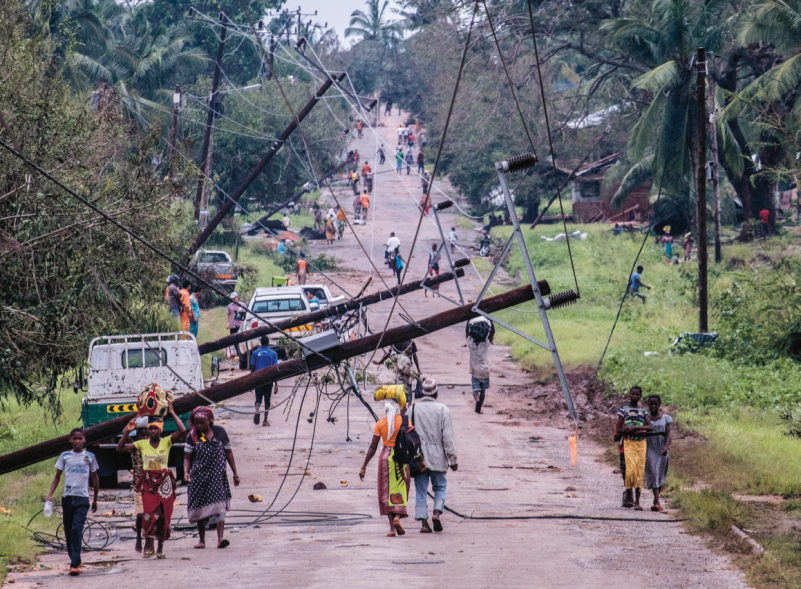Share post now

global
The Alliance Sud magazine analyses and comments on Switzerland's foreign and development policies. "global" is published four times a year (in german and french) and can be subscribed to free of charge.
Article, Global
20.06.2023, Finance and tax policy
Even at the height of the climate crisis, gas mega-projects are being mounted in Mozambique by oil majors, including TotalEnergies, in which the Swiss National Bank holds a stake. These projects are fuelling conflicts while not benefiting the people.

Downed power lines in Macomia, northern Mozambique, after Cyclone Kenneth in 2019.
© Tommy Trenchard/Panos Pictures
Following the discovery of immense natural gas reserves in 2010 off the coast of Cabo Delgado province in northern Mozambique, gas and oil multinationals have launched massive liquefied natural gas (LNG) projects. These projects figure in the OECD report on "Private finance mobilised by official development finance interventions". They include deep-sea mining (at a record depth of 2000m!), a submarine pipeline and processing plants on land, as well as an LNG export terminal. Two mega-projects (Rovuma LNG and Coral South FLNG Project) constitute a joint venture between the USA's ExxonMobil, Italy's ENI and China's government-owned CNPC. The principal shareholder and operator of the Mozambique LNG project is the France's TotalEnergies corporation, in conjunction with Mitsui (Japan) and Mozambican, Indian and Thai investors. It should be recalled that the Swiss National Bank (SNB) currently holds shares in TotalEnergies worth about 620 million USD.
The total amount invested in LNG projects in Mozambique is estimated at some USD 60 billion, or almost four times Mozambique's GDP. According to the African Development Bank (ADB) – one of the project's public donors together with export credit agencies (ECA) mainly in the United States and the United Kingdom – these projects represent the largest foreign direct investment (FDI) to date and the largest project funding in Africa. They should make Mozambique the world's third largest LNG supplier, and contribute more than USD 67 billion directly to Mozambique's GDP. The projects will provide gas for export to Europe and Asia (mainly India and China), but also aims to supply LNG for the industrial development of the country and the southern African region.
Besides Mozambique, Nigeria, Egypt, Algeria as well as Senegal and Mauritania are also striving to increase their LNG exports, especially to Europe. LNG advocates deem this energy source to be indispensable to the energy transition, as it produces 50 per cent less CO2 emissions than coal-based energy. Conversely, in its report titled Net Zero by 2050 published in May 2021, the International Energy Agency (IEA) called for an immediate end to investment in fossil energy production, so that worldwide energy-related CO2 emissions can be brought to net zero by 2050, thereby limiting global warming to 1.5°C.
The province of Cabo Delgado is one of the country's poorest regions. Besides being hit by cyclones and floods that have further compounded poverty and food insecurity, the region is also gripped by an uprising against the Mozambican Government, stemming from various factors, but which may also be linked to the extraction of the region's natural resources. Armed groups, some with links to terrorist organisations such as Islamic State, have launched violent attacks on local communities, forces of law and order, and on gas infrastructure. By UN estimates, more than 700,000 people have been displaced in the region since the uprising began.
The international community has provided humanitarian assistance for the people affected. In February last, the President of the Swiss Confederation, Alain Berset, together with his Mozambican counterpart, Felipe Jacinto Nyusi, visited a refugee camp and SDC projects in the province. Mozambique has been a priority country for Swiss cooperation since 1979.
The EU has in turn stepped up its financial support, among other things, for Rwandan defence forces stationed in Mozambique to ensure that the gas projects can come on stream as quickly as possible, thereby reducing EU dependence on Russian gas.
According to its own information, the Swiss National Bank (SNB) currently holds shares worth almost USD 620 million in TotalEnergies capital. Besides its operations in Mozambique, TotalEnergies plans to build a 1400-km pipeline called EACOP, which will run through Tanzania and Uganda and will jeopardise the livelihoods of thousands of people and also the environment. At its recent annual meeting, the Swiss Climate Alliance, of which Alliance Sud is a member, joined other NGOs in the "SNB Coalition" in calling for all fossil assets to be divested and for SNB investment, monetary and foreign exchange policies to be aligned with the aims of the Paris Climate Agreement. Tanzanian NGO representatives have called on the SNB management to divest its stake in TotalEnergies immediately.
Share post now

global
The Alliance Sud magazine analyses and comments on Switzerland's foreign and development policies. "global" is published four times a year (in german and french) and can be subscribed to free of charge.